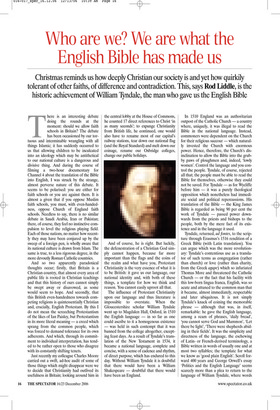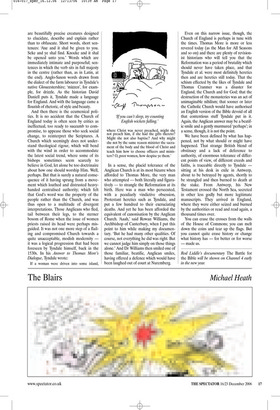Who are we? We are what the English Bible has made us
Christmas reminds us how deeply Christian our society is and yet how quirkily tolerant of other faiths, of difference and contradiction. This, says Rod Liddle, is the historic achievement of William Tyndale, the man who gave us the English Bible There is an interesting debate doing the rounds at the moment: should we allow faith schools in Britain? The debate has been occasioned by our tortuous and interminable wrangling with all things Islamic; it has suddenly occurred to us that allowing children to be inculcated into an ideology which may be antithetical to our national culture is a dangerous and divisive thing. And during the course of filming a two-hour documentary for Channel 4 about the translation of the Bible into English, I was struck by the strange, almost perverse nature of this debate. It seems to be polarised: you are either for faith schools or you are against them. It is almost a given that if you oppose Muslim faith schools, you must, with even-handedness, oppose Church of England faith schools. Needless to say, there is no similar debate in Saudi Arabia, Iran or Pakistan; there, of course, they feel no instinctive compulsion to level the religious playing field. Each of those nations, no matter how recently they may have been conjured up by the sweep of a foreign pen, is wholly aware that its national culture is drawn from Islam. The same is true, to a less rigorous degree, in the more devoutly Roman Catholic countries.
And so two apparently paradoxical thoughts occur; firstly, that Britain is a Christian country, that almost every area of public life is rooted in Christian teachings and that this history of ours cannot simply be swept away or disavowed, as some would seem to hope. And secondly, that this British even-handedness towards competing religions is quintessentially Christian and, crucially, English Protestant. By this I do not mean the screeching Protestantism of the likes of Ian Paisley, but Protestantism in its more literal meaning — a creed which sprang from the common people, which was forced to demand tolerance for its own adherents. And which, through its commitment to individual interpretation, has tended to be rather open to those who disagree with its constantly shifting tenets.
Just recently my colleague Charles Moore carried out a swift, ad-hoc audit of some of those things which might disappear were we to decide that Christianity had outlived its usefulness in Britain; looking around him in the central lobby at the House of Commons, he counted 17 direct references to Christ ‘in as many seconds’; to expunge Christianity from British life, he continued, one would also have to rename most of our capital’s railway stations, tear down our national flag (and the Royal Standard) and melt down our coinage, rename our Oxbridge colleges, change our public holidays.
And of course, he is right. But luckily, the defenestration of a Christian God simply cannot happen, because far more important than the flags and the coins of the realm and what have you, Protestant Christianity is the very essence of what it is to be British: it gave us our language, our national identity and, with both of these things, a template for how we think and reason. You cannot easily uproot all that.
The influence of Protestant Christianity upon our language and thus literature is impossible to overstate. When the Gloucestershire scholar William Tyndale went up to Magdalen Hall, Oxford, in 1510 the English language — in so far as one could ascribe to it a homogenous existence — was held in such contempt that it was banned from the college altogether, excepting feast days. As a result of Tyndale’s translation of the New Testament in 1534, it became a national language, complete and concise, with a sense of cadence and rhythm, of direct purpose, which has endured to this day. Without William Tyndale it is doubtful that there would have been a William Shakespeare — doubtful that there would have been an England. In 1510 England was an authoritarian outpost of the Catholic Church — a country where, uniquely, it was illegal to read the Bible in the national language. Instead, commoners were dependent on the Church for their religious succour — which naturally invested the Church with enormous power. Hence, therefore, the Church’s disinclination to allow the Bible into the grubby paws of ploughmen and, indeed, ‘lowly women’. Control the language and you control the people. Tyndale, of course, rejected all that; the people must be able to read the Bible for themselves, otherwise they could not be saved. For Tyndale — as for Wycliffe before him — it was a purely theological opposition which nonetheless had immediate social and political repercussions. His translation of the Bible — the King James Bible is regarded as being 90 per cent the work of Tyndale — passed power downwards from the priests and bishops to the people, both by the mere fact of its existence and in the language it used.
Tyndale, returned, ad fontes, to the scripture through Erasmus’s 1516 rendition of a Greek Bible (with Latin translation). You can argue which was the more revolutionary: Tyndale’s contentious use as a translator of such terms as congregation (rather than church) or love (rather than charity, from the Greek agape) which so infuriated Thomas More and threatened the Catholic Church — or the fact that his facility with this low-born lingua franca, English, was so acute and attuned to the common man that it became, almost immediately, respectable and later ubiquitous. It is not simply Tyndale’s knack of coining the memorable phrase — although that was, in itself, remarkable: he gave the English language, among a ream of phrases, ‘daily bread’, ‘you cannot serve God and Mammon’, ‘Let there be light’, ‘There were shepherds abiding in their fields’. It was the simplicity and directness of the language, the eschewing of Latinor French-derived terminology, a Bible written in words of usually one and at most two syllables; the template for what we know as ‘good plain English’. Scroll forward 400 years and George Orwell’s essay ‘Politics and the English Language’ seems scarcely more than a plea to return to the language of William Tyndale, where words are beautifully precise creatures designed to elucidate, describe and explain rather than to obfuscate. Short words, short sentences: ‘Axe and it shal be given to you. Seke and ye shal find. Knocke and it shal be opened unto you.’ Words which are immediately intimate and purposeful; sentences in which the verb sits in full majesty in the centre (rather than, as in Latin, at the end). Anglo-Saxon words drawn from the dialect of the farm labourer in Tyndale’s native Gloucestershire; ‘mizzen’, for example, for drizzle. As the historian David Daniell puts it, Tyndale made a language for England. And with the language came a flourish of rhetoric, of style and beauty.
And then there is the ecumenical politics. It is no accident that the Church of England today is often seen by critics as ineffectual, too ready to succumb to compromise, to appease those who seek social change, to reinterpret the Scriptures. A Church which seemingly does not understand theological rigour, which will bend with the wind in order to accommodate the latest social trend, where some of its bishops sometimes seem scarcely to believe in God, let alone be too doctrinaire about how one should worship Him. Well, perhaps. But that is surely a natural consequence of it having sprung from a movement which loathed and distrusted heavyhanded centralised authority; which felt that God’s word was the property of the people rather than the Church, and was thus open to a multitude of divergent interpretations. Those Anglicans who fled, tail between their legs, to the sterner bosom of Rome when the issue of women priests raised its head were perhaps misguided. It was not one more step of a flailing and compromised Church towards a quite unacceptable, modish modernity it was a logical progression that had been foreseen by Tyndale himself, back in the 1530s. In his Answer to Thomas More’s Dialogue, Tyndale wrote:
If a woman were driven into some island, where Christ was never preached, might she not preach him, if she had the gifts thereto? Might she not also baptise? And why might she not by the same reason minister the sacrament of the body and the blood of Christ and teach him how to choose officers and ministers? O, poor women, how despise ye them.’
In a sense, the placid tolerance of the Anglican Church is at its most bizarre when afforded to Thomas More, the very man who attempted — both literally and figuratively — to strangle the Reformation at its birth. Here was a man who persecuted, with a peculiarly vindictive obsession, Protestant heretics such as Tyndale, and put a few hundred to their excruciating deaths. And yet he has been afforded the equivalent of canonisation by the Anglican Church. ‘Aaah,’ said Rowan Williams, the Archbishop of Canterbury, when I put this point to him while making my documentary. ‘But he had many other qualities. Of course, not everything he did was right. But we cannot judge him simply on those things alone.’ And Dr Williams then smiled one of those familiar, beatific, Anglican smiles, having offered a defence which would have been laughed out of court at Nuremberg. Even on this narrow issue, though, the Church of England is perhaps in tune with the times. Thomas More is more or less revered today (as the Man for All Seasons and so on) and there are plenty of revisionist historians who will tell you that the Reformation was a period of brutality which should never have taken place, and that Tyndale et al. were most definitely heretics then and are heretics still today. That the schism effected by the likes of Tyndale and Thomas Cranmer was a disaster for England, the Church and for God; that the destruction of the monasteries was an act of unimaginable nihilism; that sooner or later the Catholic Church would have authorised an English version of the Bible devoid of all that contentious stuff Tyndale put in it. Again, the Anglican answer may be a beatific smile and a gently murmured ‘perhaps’; in a sense, though, it is not the point.
We have been defined by what has happened, not by what should or might have happened. That strange British blend of obstinacy and a lack of deference to authority, of enormous tolerance of different points of view, of different creeds and faiths, is traceable directly to Tyndale sitting at his desk in exile in Antwerp, about to be betrayed by agents, shortly to be strangled and then burned to death at the stake. From Antwerp, his New Testament crossed the North Sea, secreted in other less godly but more legitimate manuscripts. They arrived in England, where they were either seized and burned by the authorities or read and read again, a thousand times over.
You can erase the crosses from the walls of the House of Commons; you can melt down the coins and tear up the flags. But you cannot quite erase history or change what history has — for better or for worse — made us.







































































































































 Previous page
Previous page